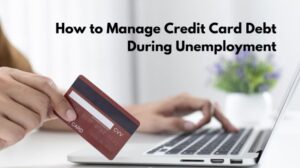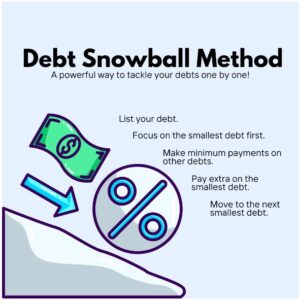The anxiety of losing a steady income and the looming threat of accumulating debt can make unemployment even more stressful. Managing credit card debt without a regular paycheck is crucial. However, with careful planning and strategic measures, you can navigate this difficult period and reduce your financial stress. Here is a complete guide on how to manage credit card debt during unemployment.

1. Your Financial Situation
To manage your credit card debt during unemployment, the first step is to take an honest look at your financial situation. First, make a detailed budget that includes:
- Current Income: Include unemployment benefits, any nest-egg savings that you might be using to live on, and/or part-time income.
- Essential Expenses: You will list all necessary expenses such as rent/mortgage, utilities, groceries, and healthcare.
- Discretionary Expenses: Items you can cut back or omit from the budget are considered discretionary.
- Credit Card Balances: Identify the present balances, interest rates, and the minimum due for the month respecting each card.
Understanding your financial position will help you prioritize expenses and make informed decisions about managing your credit card debt.
2. Call Your Credit Card Companies
The moment you begin falling behind on a payment, prioritizing your credit card debt settlement should be the next course of action. The sooner you contact your credit card issuer to discuss your situation, the better. Most credit card companies have some form of hardship programs that can include but are not limited to the following:
- Reduced Interest Rates: With some, the interest rates will be lowered for a while.
- Payment Plans: You may be able to negotiate a more reasonable payment plan.
- Deferred Payments: You can, in certain circumstances, work out a deferment or forbearance for temporary periods.
Explain your situation and express your willingness to work out a plan. You may secure better terms that reduce or eliminate late fees and negative credit reporting.
3. Prioritize Your Debts
When there is not enough money, the tough decisions about which debt to pay first must be made. Consider the following methods:
- Pay the minimum: Make sure to at least pay the minimum on all of your credit cards so you do not have to deal with any late fees or negative credit implications.
- Focus on high-interest debt: If at all possible, use any additional money to pay off the credit card that has the higher interest rate first. This will save you money over time by reducing the total interest paid.
- Debt snowball method: Alternatively, you can use the debt snowball method, focusing on paying off the smallest balance first. This could provide you with some psychological motivation and a feeling of momentum.

4. Develop a Realistic Budget
Now that your income has been reduced or lost, it is vital to create a realistic budget. Prioritize resource allocation based on priority and need:
- Track expenses: Keep a record of all your expenditures to stay within your budget. Cut unnecessary spending:
- Cut non-essential spending: Reduce non-essential spending on dining out, entertainment, and high-end goods to practically nothing.
- Adjust your lifestyle: Be prepared for temporary lifestyle changes because of reduced income. This might involve moving to a more affordable home or switching to public transportation.
5. Consider Alternative Sources of Income
The unemployment stage does not necessarily mean that you have to bear all the financial burdens. You can always seek other means to earn some extra money for you. Some of these may include:
- Freelancing or gig work: Pursue freelance opportunities, gig economy jobs, or part-time work that fits your schedule.
- Selling unused goods: Get cash through the disposal of things you are no longer using.
- Renting out assets: If you have an extra room or valuable assets, consider renting them out for additional income.
6. Use Emergency Money
If you have set aside money in an emergency fund, now is the time to use it. An emergency fund is your good friend in times when unexpected expenses crop up. It can provide temporary relief during your unemployment:
- Withdraw strategically: Use your emergency fund wisely to cover essential expenses without depleting it too quickly.
- Refill after getting a job: If you get a job, first thing-writing off debt apart-rebuild your emergency fund to tide over future contingencies.
7. Explore Financial Assistance Programs
Many government and nonprofit organizations offer financial assistance programs to help support you during unemployment, including:
- Unemployment benefits: Ensure you claim all unemployment benefits for which you are eligible.
- Food assistance programs: Commonly known as SNAP, these programs help cover grocery expenses.
- Utility assistance: Several programs offer temporary aid with utility bills.
- Credit counseling: A nonprofit credit counseling agency can provide valuable advice and support to help you manage your debt.
8. Communicate Openly
Open communication with creditors, lenders, and financial advisors throughout unemployment is vital. Keep them abreast of your situation and any variation in financial status. Maintaining regular communication can lead to flexible arrangements and prevent misunderstandings.
9. Steer Clear of More Debt
It should be vital not to increase your debt relating to credit cards as an unemployed person. Here are a few tips to keep you on the right track:
- Go by cash or debit: Pay with cash or debit cards to avoid accumulating new credit card debt.
- Establish financial goals: Clearly define your financial goals and avoid unnecessary purchases to stay on track.
- Seek financial education: Learn personal finance management to make informed decisions and avoid common pitfalls.
10. Rebuild Finances After Employment
Once you get a new job and are back on your feet, take the following actions to begin rebuilding:
- Create a savings plan: You will want to develop a new financial plan in which saving money is the first order of business; aim at creating an emergency fund that would cushion you from future shocks.
- Debt repayment: Allocate part of your new income to begin paying off the remaining credit card debt.
- Monitoring of credit: Frequently, pull your credit report to confirm your score is improving and to correct any errors in the report.
Conclusion
Managing credit card debt in a period of unemployment is fraught with challenges, but a little forethought and strategy will see you through the phase more convincingly. You will be able to evaluate your financial situation, communicate with your creditors, prioritize your debts, and consider sources of alternate income to lessen the financial stress and head toward recapturing stability. Remember, financial recovery does take a good amount of time, but the key to resurfacing from such a scenario is persistence with discipline.
FAQs
What is the course of action if one is not able to pay on credit cards due to unemployment?
If you cannot make your payments on your credit cards, immediately contact your credit card issuer to discuss any potential hardship programs or payment plans. They may be willing to offer temporary relief options, including reduced payments or deferred payments, which could help you through this period.
How to avoid accumulating more credit card debt while unemployed?
In this respect, try cash or debit cards for purchases, keeping track of how much money is spent every day to make sure the amount does not go over the budget. Additionally, setting clear financial goals and avoiding non-essential expenses will help you stay on track.
Would using unemployment benefits to repay credit card debt be a good idea?
Yes, unemployment benefits could be used to pay off credit card debt; however, it is very crucial to attend to house and food first. Any money remaining should be spent on debt repayment to keep your burdens manageable.



